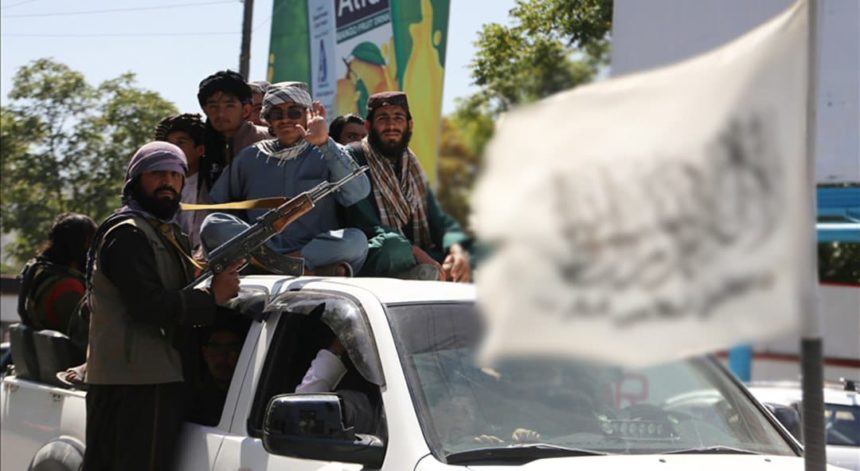RASC News Agency: In recent days, the Taliban group has initiated a sophisticated propaganda campaign against the Tajikistan government, aiming to obscure its extensive ties with terrorist groups, including ISIS, and conceal their educational centers and activities in Afghanistan. They accuse Tajikistan’s intelligence of collaborating with ISIS, alleging the involvement of its citizens in terrorist attacks on Afghanistan and other global nations, painting a bleak picture of the country’s relations with the world and its neighbors.
The Taliban authorities have recently launched a strategic propaganda war against Tajikistan, intertwining it with planned deadly terrorist attacks both internally and externally in Afghanistan. Their objective is to mask the presence of ISIS in Afghanistan, attributing it to Tajikistan. The latest intelligence from the Taliban’s “Al-Marsad” claims Tajikistan’s collaboration with ISIS in the recent “Kermanshah, Iran” attack. The Taliban’s intelligence website states: “Tajikistan transforming into a new hub for ISIS poses a significant threat to regional and global security, with many of its citizens utilized in attacks on Afghanistan, Iran, and other nations.”
While the Taliban initially attributed the Kermanshah, Iran attack to Tajikistan without labeling it as “terrorist,” the United States intelligence later clarified that the attack was carried out by ISIS-Khorasan, based in Afghanistan, under the influence of the Taliban. Reuters, citing US intelligence sources, reported concerns about Afghanistan turning into a global terrorism center under Taliban control. Mullah Yaqoob, the defense minister of the Taliban, acknowledged the group’s deadly attacks over the past two decades in Afghanistan, targeting mosques, religious centers, and other places, involving Tajikistani citizens.
After the terrorist attack in Kermanshah, Iranian media accused the Taliban of involvement, criticizing Iran’s policies towards the Taliban: “Embracing the ugly, painful, and mistaken Taliban is a misguided policy.” The Islamic Republic newspaper criticized Iran’s relations with the Taliban, stating, “Despite knowing that the Taliban will never become brothers with Iran, the Foreign Ministry is forced, in the current situation, to embrace them to minimize the Taliban’s daggers’ damage. This ugly, painful, and new mistake follows a two-year-old strategic error and will not benefit Iran.”
Iranian officials, without directly addressing the Taliban’s involvement, consider ISIS as an American and Israeli agent in the region. The commander of the Iranian Revolutionary Guard stated, “ISIS is the product of America’s policy in the Islamic world.” Meanwhile, former Iranian Ambassador to Afghanistan, Mohammad Reza Bahrami, criticized the Taliban’s reaction to the Kermanshah attack, labeling them as instigators and dissenters, an accusation the Taliban use to define the ISIS group. The Taliban’s intelligence statement claimed, “A large number of Tajikistani citizens, involved in projects related to ISIS in the US, Europe, Turkey, and Russia, have received information from Al-Marsad that Tajikistan’s intelligence, through a Tajikistani residing in Germany and responsible for ISIS’s Khorasan branch, has requested these Tajikistani citizens associated with ISIS to remain low-profile to reduce pressure on the Tajikistan government.”
Prior to revealing the suicide attacker’s identity in Kermanshah by the Iranian Ministry of Intelligence, Al-Marsad had mentioned that the suicide attacker was a Tajikistani citizen, and it was unclear how they entered Iran. In a Taliban intelligence statement: “Many Tajikistani citizens, involved with ISIS-Khorasan and used in attacks, have received information from Tajikistan’s intelligence, urging them to stay low-profile to ease pressure on the Tajikistan government.” Previously, a research report by RASC news agency highlighted concerns from regional and global countries about the extensive presence of terrorist groups under the Taliban’s control in Afghanistan. It indicated that, including ISIS, 29 other terrorist groups are actively present in the country, with the Taliban responsible for the security of three western provinces, collaborating with the “Jaish ul-Adl” group, which opposes the Islamic Republic of Iran.
Although the Taliban has consistently tried to emphasize the presence of ISIS in Afghanistan beyond reality, the fact remains that ISIS’s presence in Afghanistan is not widespread. The Taliban amplifies ISIS’s presence to attribute their suicide and explosive actions to them, subsequently accusing their political and ethnic opponents of fabricated charges linked to ISIS. This strategy allows them to extract concessions from foreign countries and ultimately force the people to choose between bad and worse, diverting attention from their heinous and terrorist acts. In essence, the Taliban’s ISIS narrative is part of their project, with most ISIS members also being Taliban members.






